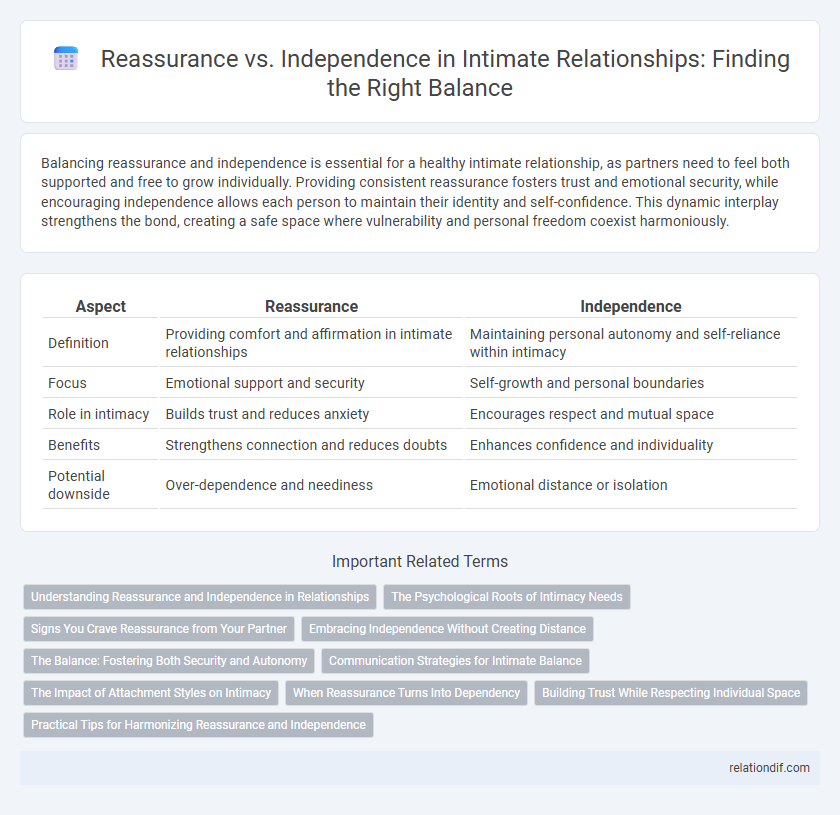Balancing reassurance and independence is essential for a healthy intimate relationship, as partners need to feel both supported and free to grow individually. Providing consistent reassurance fosters trust and emotional security, while encouraging independence allows each person to maintain their identity and self-confidence. This dynamic interplay strengthens the bond, creating a safe space where vulnerability and personal freedom coexist harmoniously.
Table of Comparison
| Aspect | Reassurance | Independence |
|---|---|---|
| Definition | Providing comfort and affirmation in intimate relationships | Maintaining personal autonomy and self-reliance within intimacy |
| Focus | Emotional support and security | Self-growth and personal boundaries |
| Role in intimacy | Builds trust and reduces anxiety | Encourages respect and mutual space |
| Benefits | Strengthens connection and reduces doubts | Enhances confidence and individuality |
| Potential downside | Over-dependence and neediness | Emotional distance or isolation |
Understanding Reassurance and Independence in Relationships
Reassurance in relationships involves consistently expressing love, support, and trust to strengthen emotional security between partners. Independence emphasizes maintaining personal identity and autonomy, ensuring both individuals grow and thrive outside the relationship. Balancing reassurance and independence fosters a healthy dynamic where emotional closeness coexists with self-confidence and mutual respect.
The Psychological Roots of Intimacy Needs
Intimacy needs stem from deep psychological roots where reassurance provides a vital sense of safety and emotional connection, fulfilling innate human desires for trust and validation. Independence, on the other hand, satisfies the need for autonomy and self-identity, allowing individuals to maintain personal boundaries and inner growth within relationships. Balancing these contrasting needs is essential for healthy emotional intimacy and personal well-being.
Signs You Crave Reassurance from Your Partner
Frequent need for validation about your appearance, decisions, or feelings signals a craving for reassurance in intimacy. If you often seek confirmation that your partner loves or accepts you, it highlights an underlying desire for emotional security. Difficulty making choices alone or feeling anxious without constant communication further indicates reliance on reassurance rather than independence.
Embracing Independence Without Creating Distance
Embracing independence within intimacy requires balancing personal freedom with emotional connection, ensuring partners feel secure without feeling confined. Providing consistent reassurance through open communication and trust-building strengthens bonds while honoring individual autonomy. Maintaining this equilibrium fosters deep intimacy where independence enhances rather than hinders closeness.
The Balance: Fostering Both Security and Autonomy
Fostering a balance between reassurance and independence in intimacy enhances both emotional security and personal autonomy, creating a foundation for healthy, lasting relationships. Providing consistent emotional support reassures partners while respecting individual boundaries promotes self-growth and confidence. This equilibrium encourages mutual trust and intimacy, enabling partners to thrive both together and independently.
Communication Strategies for Intimate Balance
Effective communication strategies for intimacy emphasize balancing reassurance and independence by fostering transparent dialogue about personal boundaries and emotional needs. Utilizing active listening techniques helps partners validate feelings while encouraging autonomy, promoting mutual respect and trust. Regularly checking in with each other ensures ongoing alignment, preventing misunderstandings and enhancing emotional connection.
The Impact of Attachment Styles on Intimacy
Attachment styles significantly influence intimacy by shaping how individuals balance reassurance and independence within relationships. Secure attachment fosters healthy intimacy through mutual reassurance and respect for personal autonomy, while anxious attachment often leads to excessive need for reassurance, potentially undermining independence. Conversely, avoidant attachment emphasizes independence to the point of emotional distance, limiting intimacy and the depth of connection between partners.
When Reassurance Turns Into Dependency
Reassurance in intimacy builds trust and emotional safety, but excessive need for it may develop into dependency, undermining personal autonomy. When individuals rely too heavily on their partner for constant validation, it can erode self-confidence and create imbalance in the relationship. Maintaining boundaries while offering support helps prevent reassurance from becoming unhealthy dependency.
Building Trust While Respecting Individual Space
Balancing reassurance with independence in intimate relationships fosters deep trust by affirming commitment without infringing on personal boundaries. Consistently validating your partner's feelings while encouraging autonomy strengthens emotional security and mutual respect. Prioritizing open communication about needs ensures each individual maintains their identity, which is essential for a healthy, lasting connection.
Practical Tips for Harmonizing Reassurance and Independence
Balancing reassurance and independence in intimacy requires clear communication about personal boundaries and emotional needs to foster trust and security. Establish routines that allow space for individual growth while regularly expressing appreciation and emotional support to reinforce connection. Encourage self-reflection and mutual respect, enabling partners to maintain autonomy without compromising closeness.
Reassurance vs independence Infographic

 relationdif.com
relationdif.com